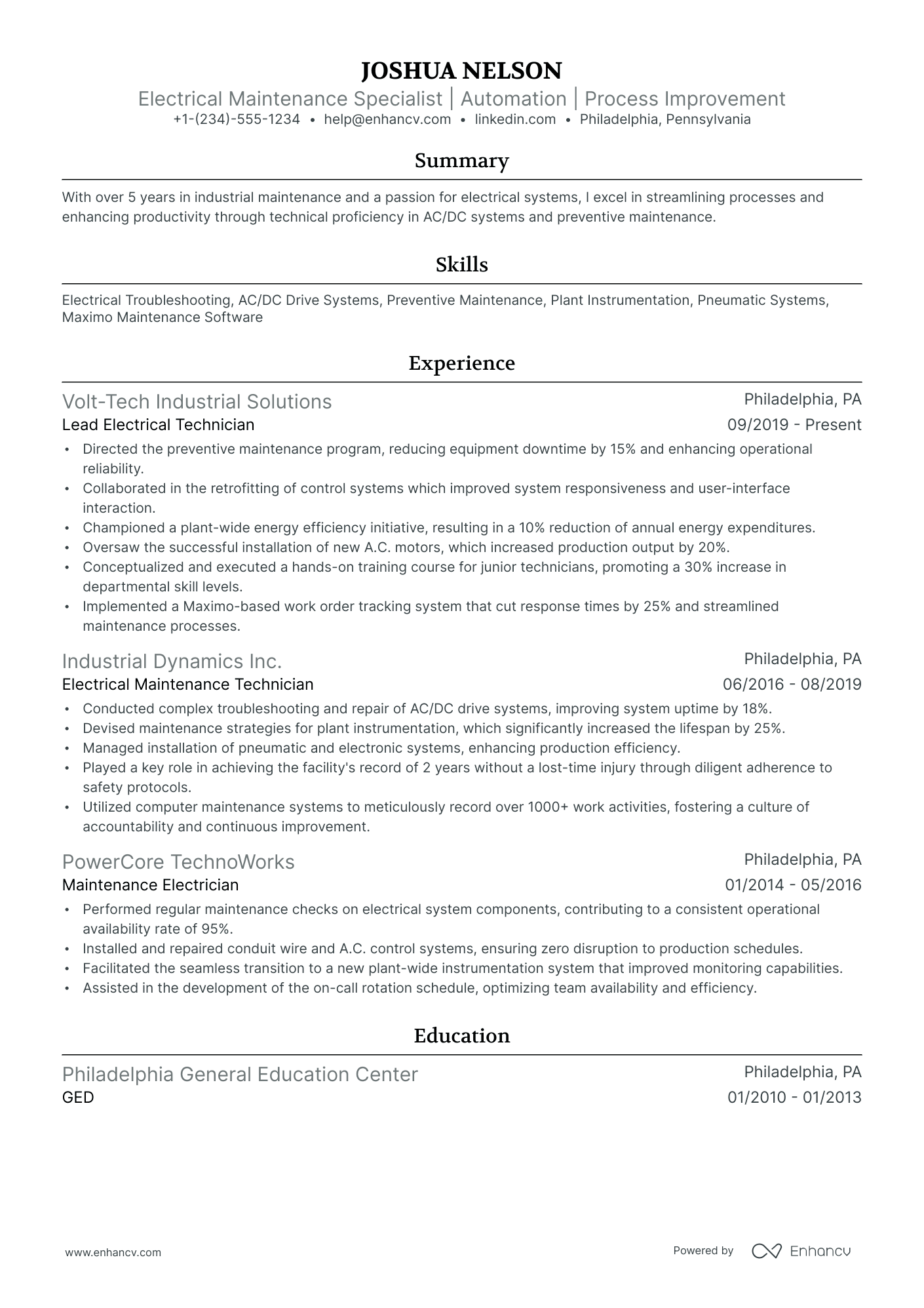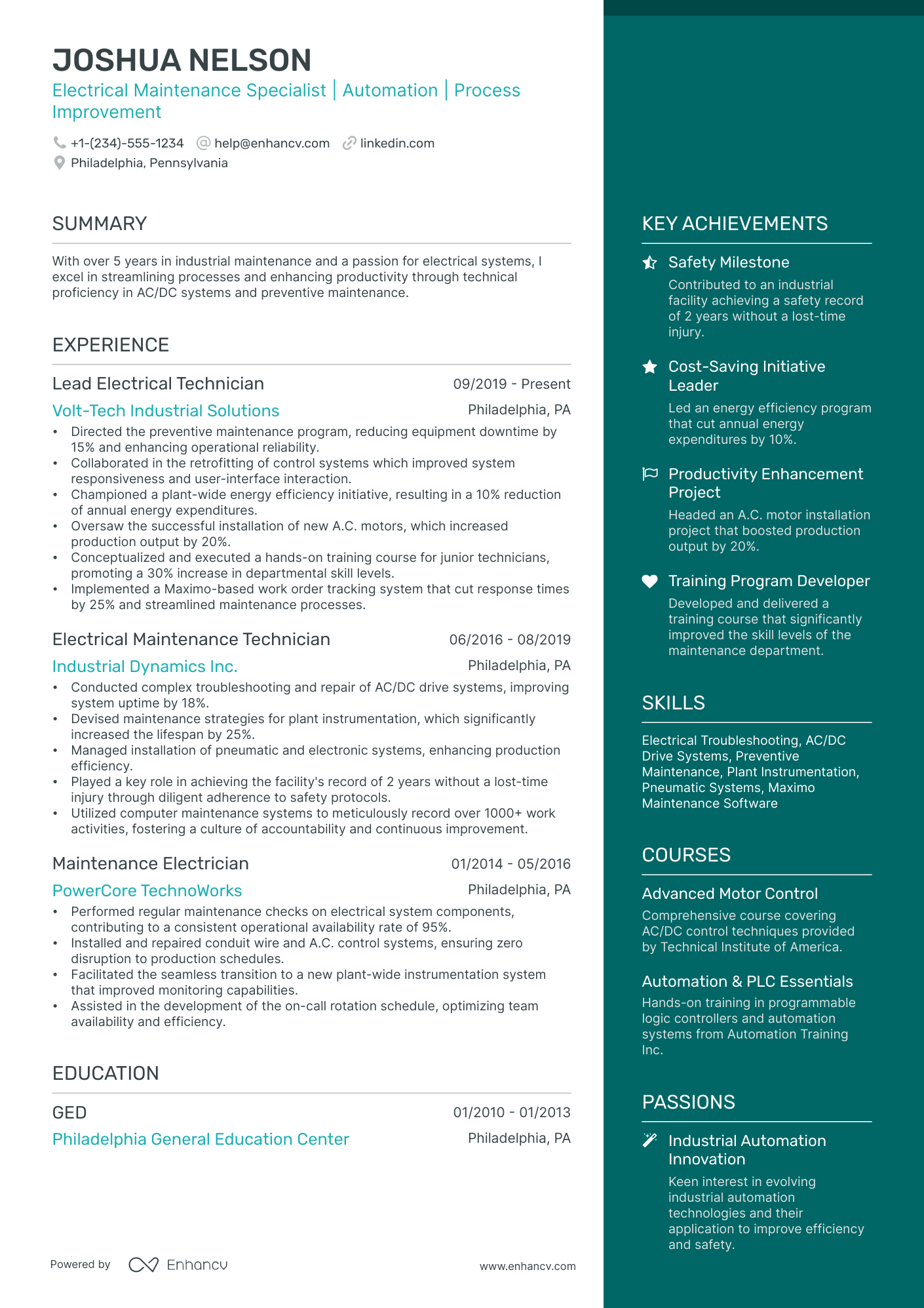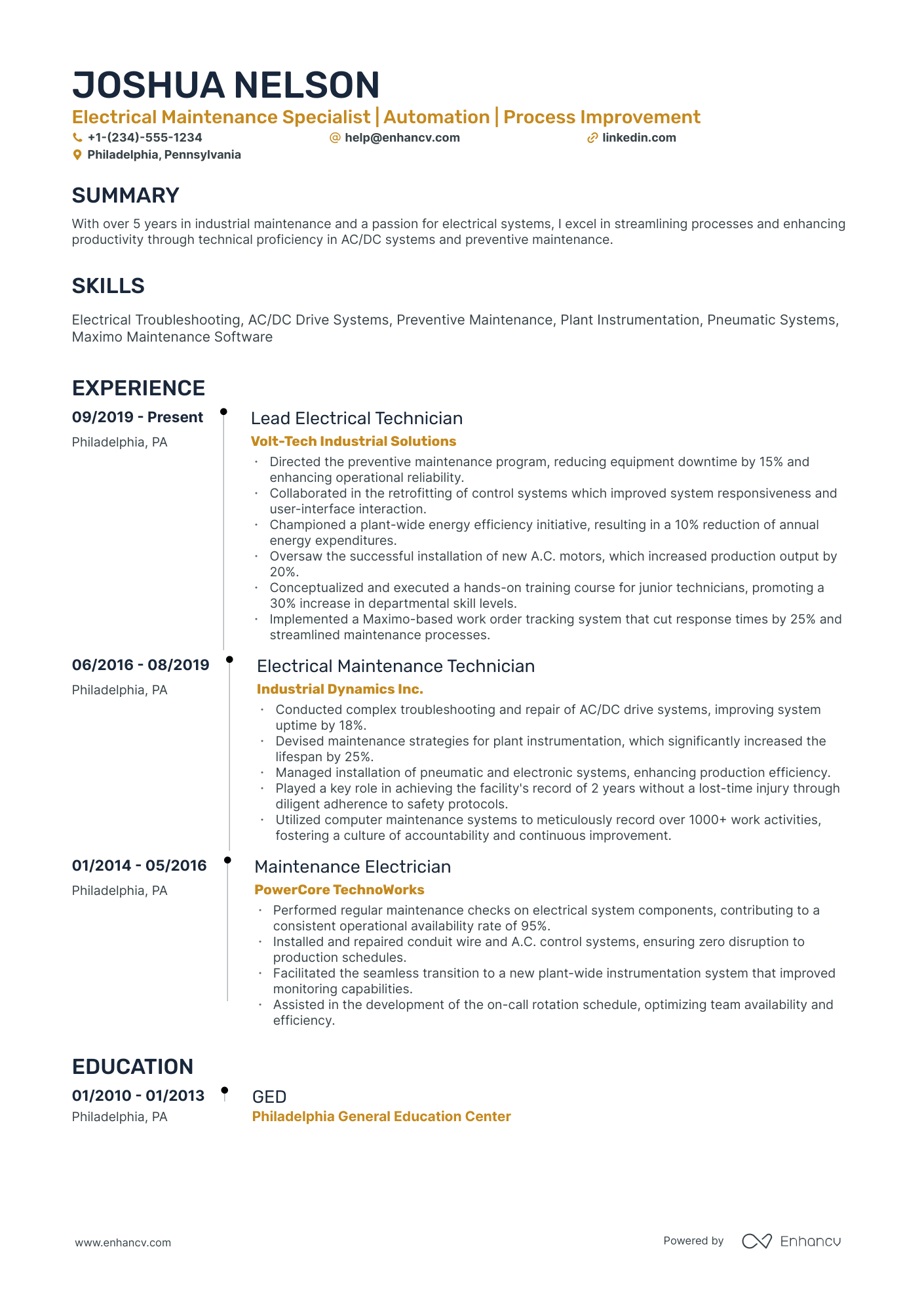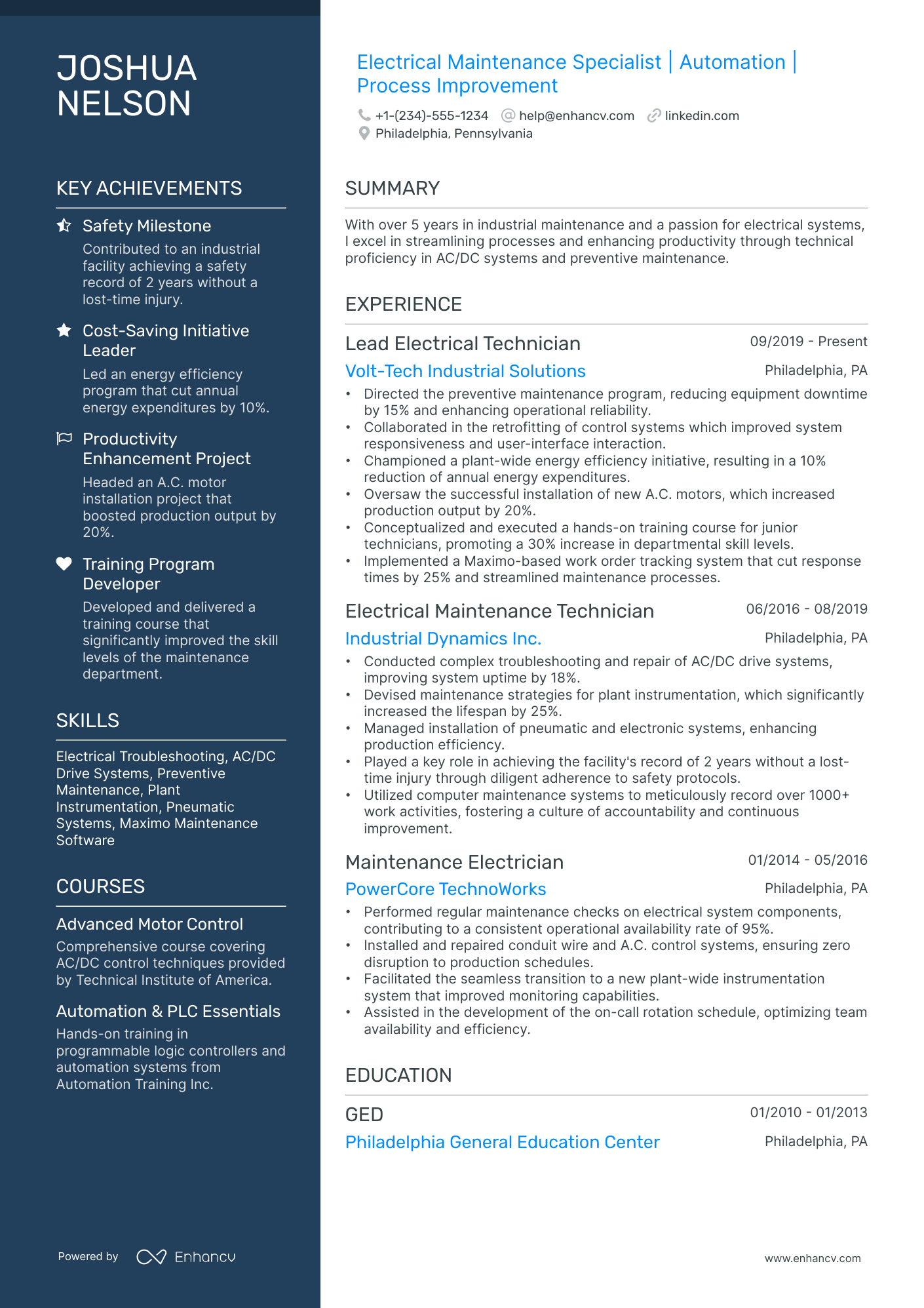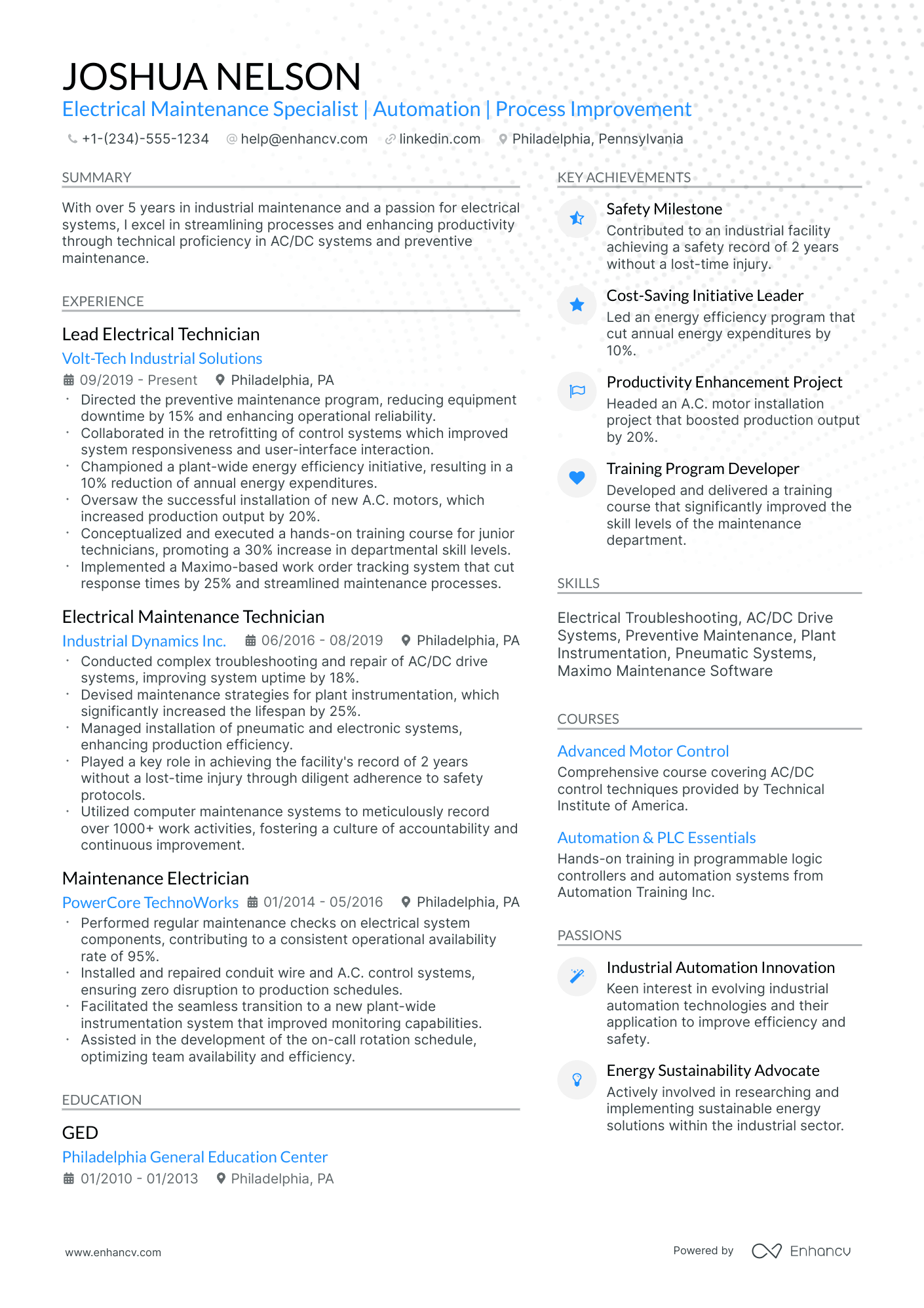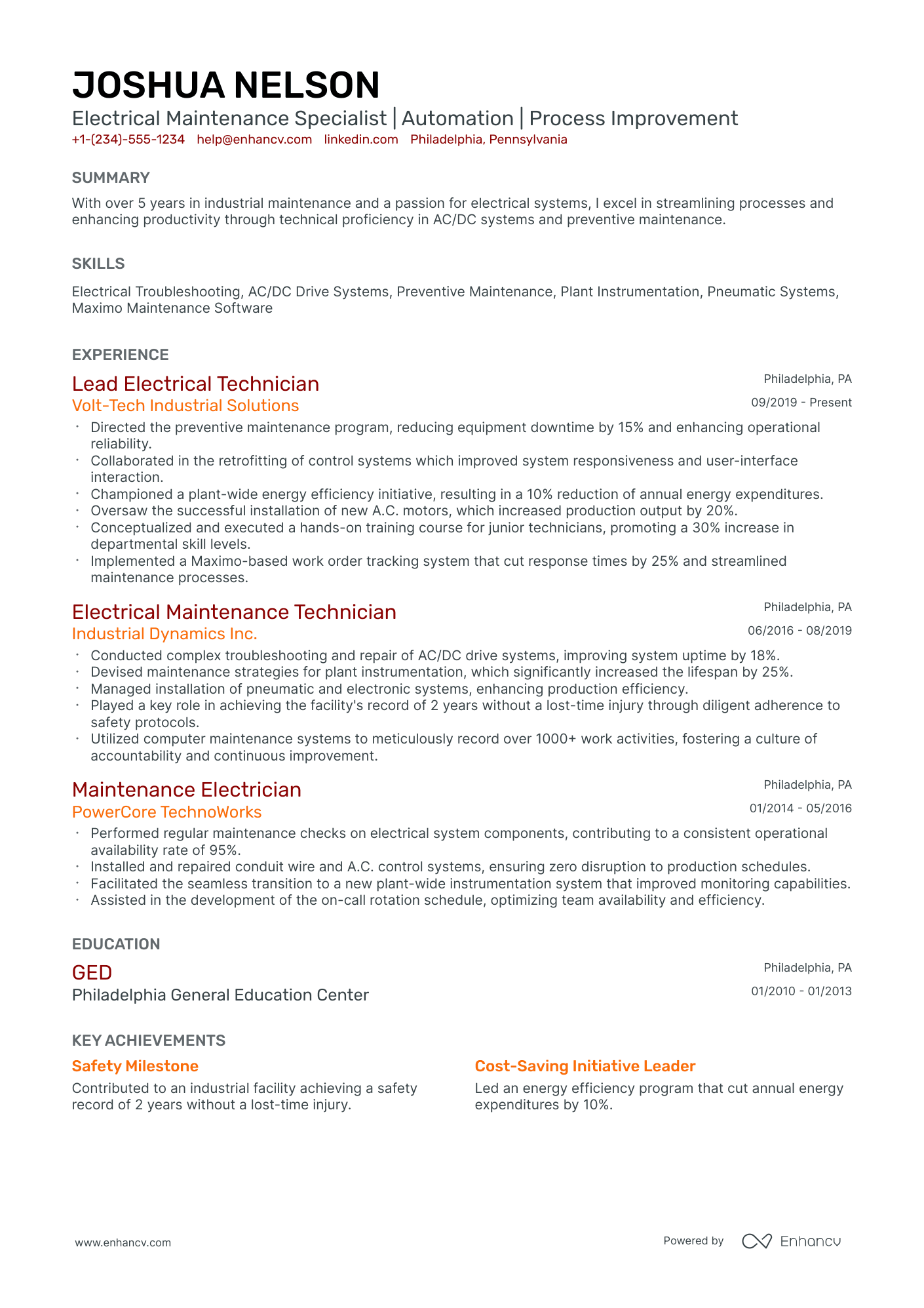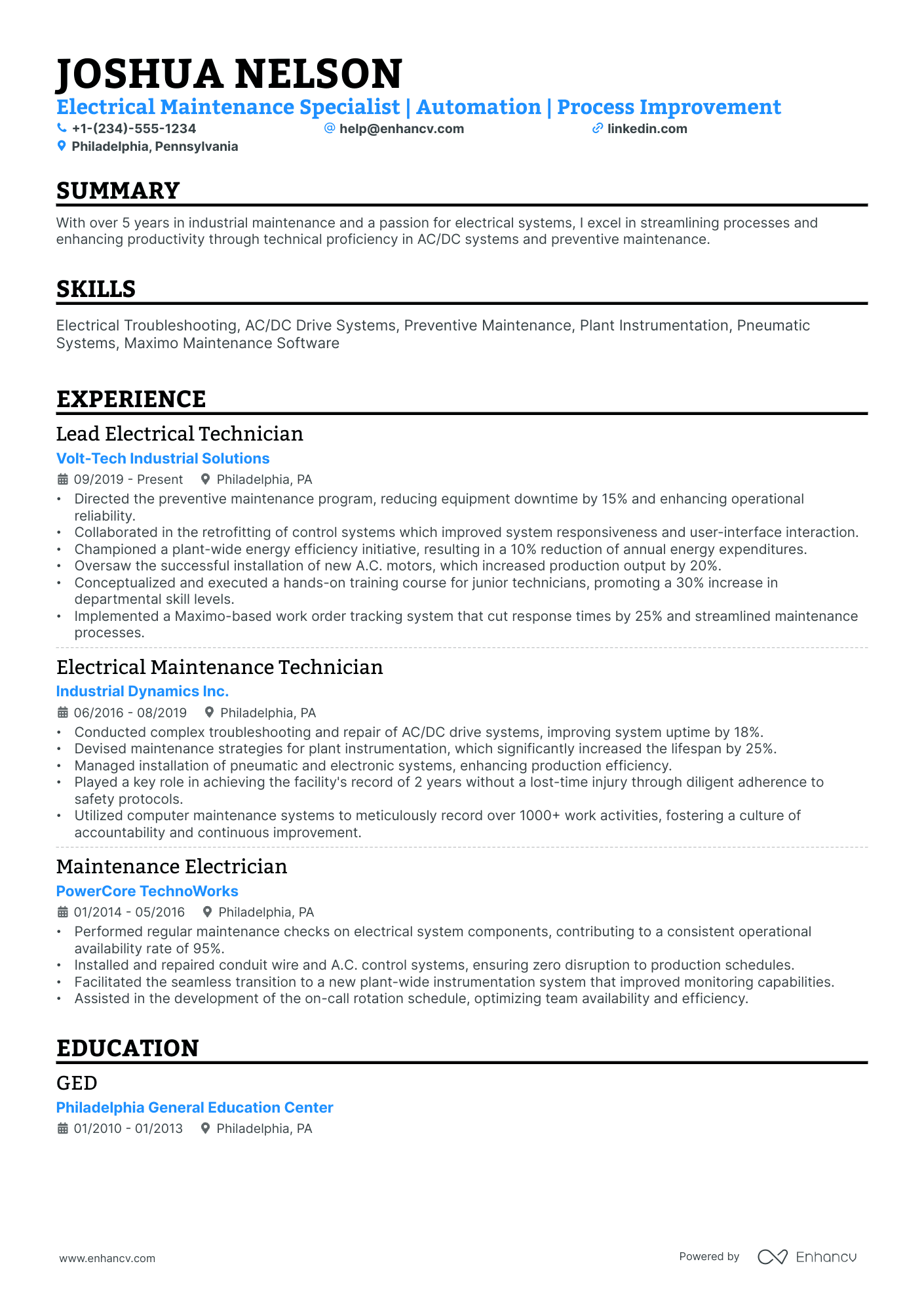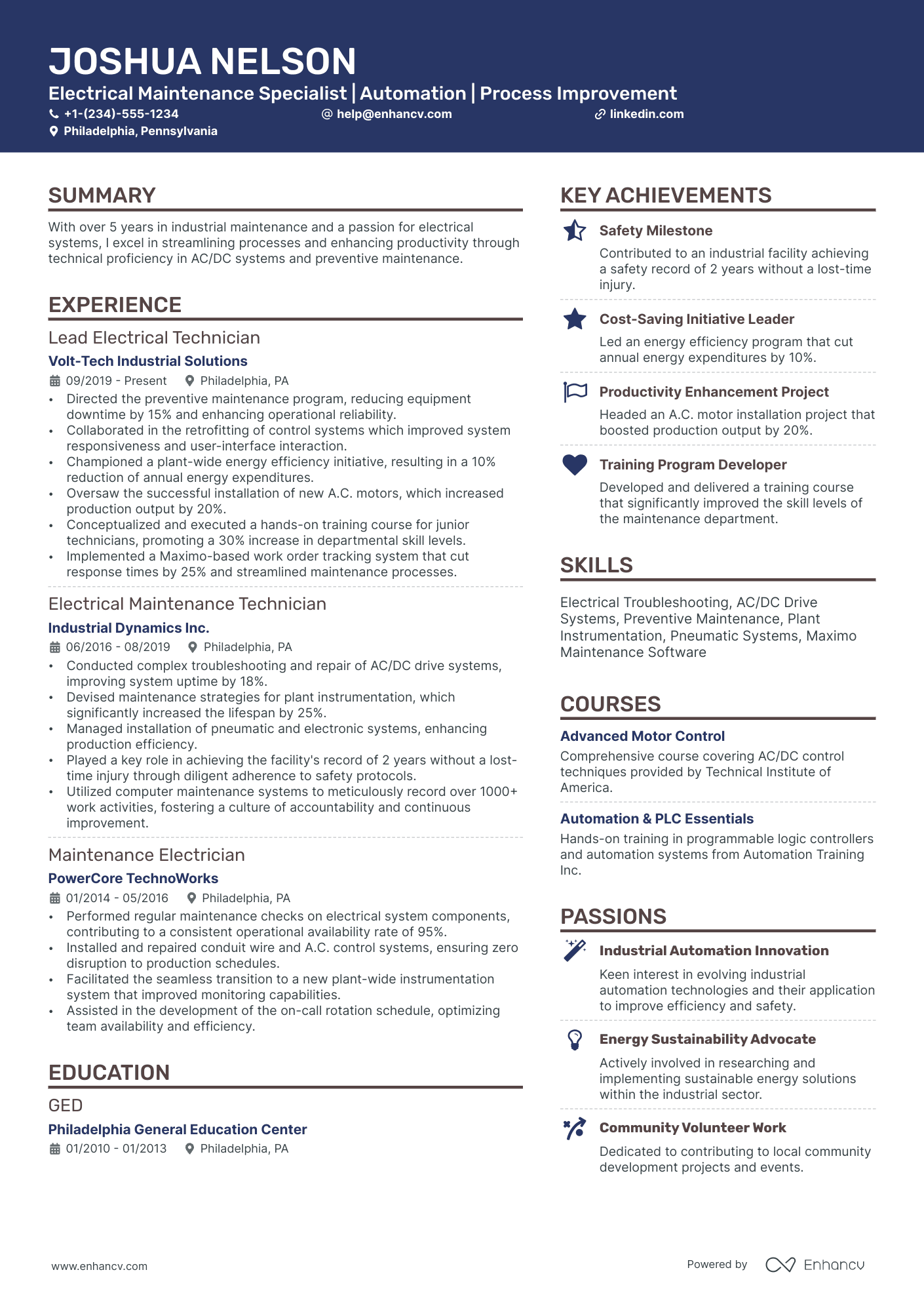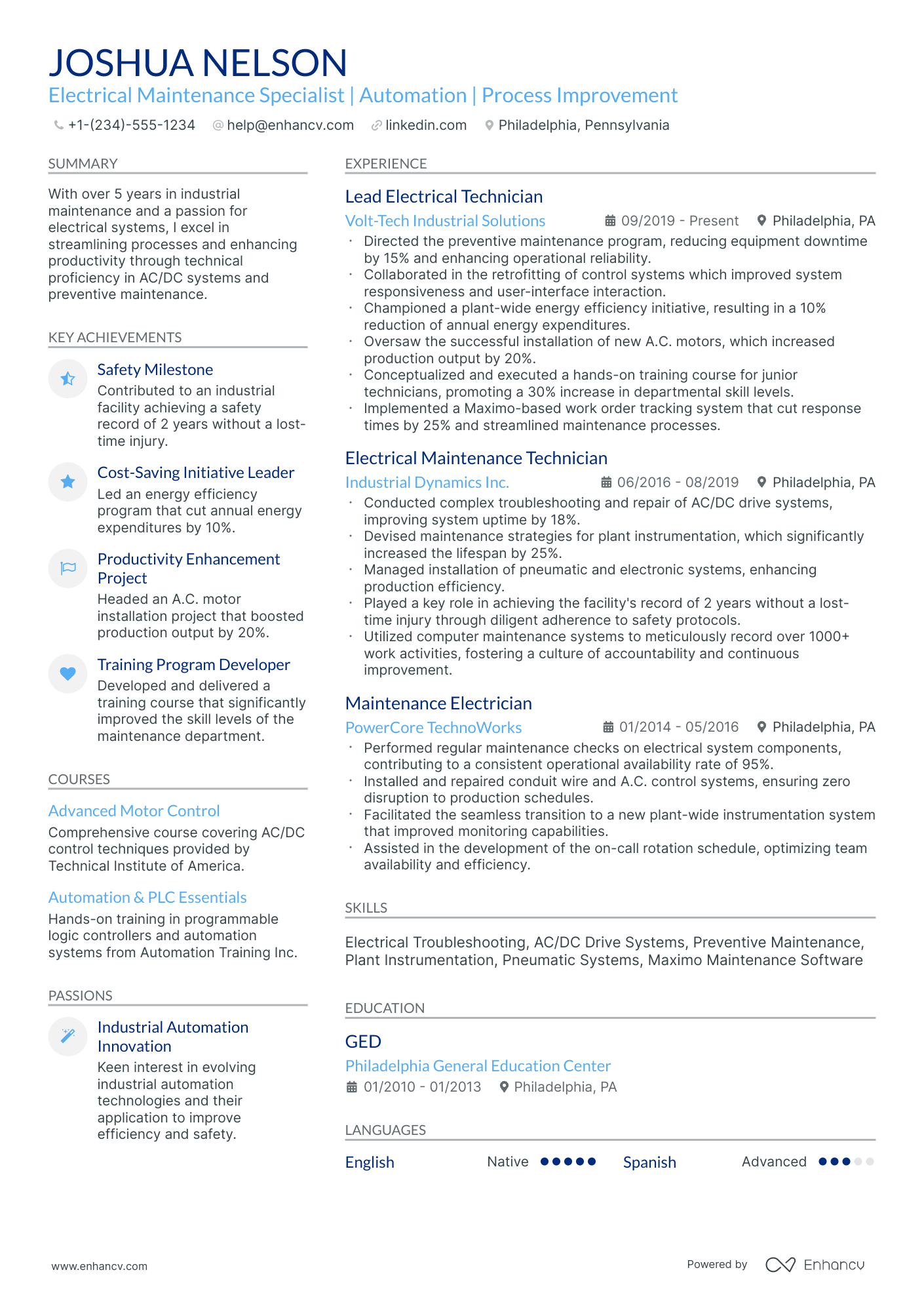As an electronic technician, you may struggle to effectively showcase the range and depth of your technical skills and experience in a concise resume format. Our guide provides targeted strategies to help you highlight your expertise in electronics and present your qualifications clearly, ensuring that your resume stands out to employers.
- Sample industry-leading professional resumes for inspiration and electronic technician resume-writing know-how.
- Focus recruiters' attention on what matters most - your unique experience, achievements, and skills.
- Write various resume sections to ensure you meet at least 95% of all job requirements.
- Balance your electronic technician technical expertise with personality to stand out amongst candidates.
If the electronic technician resume isn't the right one for you, take a look at other related guides we have:
Professional electronic technician resume format advice
Achieving the most suitable resume format can at times seem like a daunting task at hand.
Which elements are most important to recruiters?
In which format should you submit your resume?
How should you list your experience?
Unless specified otherwise, here's how to achieve a professional look and feel for your resume.
- Present your experience following the reverse-chronological resume format . It showcases your most recent jobs first and can help recruiters attain a quick glance at how your career has progressed.
- The header is the must-have element for your resume. Apart from your contact details, you could also include your portfolio and a headline, that reflects on your current role or a distinguishable achievement.
- Select relevant information to the role, that should encompass no more than two pages of your resume.
- Download your resume in PDF to ensure that its formatting stays intact.
Keep in mind the market you’re applying to – a Canadian resume, for instance, might have a unique layout.
Upload & Check Your Resume
Drop your resume here or choose a file. PDF & DOCX only. Max 2MB file size.
PRO TIP
Highlight any significant extracurricular activities that demonstrate valuable skills or leadership.
The key to your electronic technician job-winning resume - present your expertise with these sections:
- A header to make your resume more scannable
- Snapshot of who you are as a professional with your resume soft skills, achievements, and summary or objective
- Job advert keywords in the skills section of your resume
- Resume experience quantifying your past job successes with metrics
- A relevant education, certification, and technical sills section to provide background to your technological/software capabilities
What recruiters want to see on your resume:
- Experience with troubleshooting and repairing electronic equipment and systems
- Proficiency with electronic test equipment (oscilloscopes, multimeters, signal generators, etc.)
- Understanding of electrical schematics and the ability to read and interpret technical documents
- Soldering skills and experience with PCB (Printed Circuit Board) repairs and assembly
- Familiarity with industry-specific standards and regulations (such as IPC standards for electronics)
Defining your professional expertise in your electronic technician resume work experience section
The work experience section, often the most detailed part of your resume, is where you discuss your past roles and achievements. To effectively list your experience, consider these four key tips:
- Align your expertise with the job requirements. It's vital to integrate keywords matching the job criteria to pass initial assessments;
- Show, don’t just tell. Quantify your responsibilities by stating your actual achievements in previous roles;
- Include measurable metrics. For instance, how did your performance impact the annual ROI?
- Highlight crucial industry skills. Mention both technological knowledge and interpersonal skills in this section.
These guidelines will help you craft an impressive electronic technician resume work experience section that is bound to catch recruiters' attention.
- Performed failure analysis on electronic equipment for telecommunications, significantly reducing repeat issues by 40%.
- Designed and implemented new testing procedures for circuit boards, improving testing efficiency by 25%.
- Collaborated with the R&D department to assist in the development of new electronic products, leading to a successful launch of three major products.
- Serviced and calibrated complex avionics equipment, ensuring compliance with FAA regulations.
- Led a team of 5 technicians in a high-volume repair facility, completing an average of 300 repairs per month.
- Implemented an inventory management system for electronic components, resulting in a 20% reduction in part shortages.
- Managed and executed the installation of security systems across 50+ commercial properties, enhancing safety and surveillance capabilities.
- Carried out routine maintenance on electronic systems which reduced equipment downtime by 30%.
- Trained 10 new technicians, enhancing the skill set and efficiency of the electronics team.
- Investigated and resolved complex electronic malfunctions for marine navigation systems, improving system reliability by 35%.
- Directed electronic upgrades for the shipboard communication systems which improved the data transfer speeds by 50%.
- Authored a comprehensive maintenance manual for new electronics trainees, contributing to a 15% improvement in training efficiency.
- Supported manufacturing processes by maintaining robotic equipment, reducing mechanical failures by 20%.
- Assisted in developing automated systems for assembly lines which increased production output by 10% annually.
- Played a pivotal role in the troubleshooting and repair of PLCs and CNC machinery critical to the fabrication process.
- Conducted extensive testing on automotive electronics, such as ECU units, resulting in a 15% performance increase in engine management systems.
- Implemented a real-time monitoring protocol for production line machinery which decreased electronic-related malfunctions by 25%.
- Coordinated with cross-functional teams to retrofit older equipment with new technology, extending the lifespan of the machinery by 5 years.
- Spearheaded the installation of new patient monitoring systems in 200 hospital rooms, enhancing patient care and monitoring capacity.
- Performed critical software updates for medical devices that conformed to stringent industry standards, decreasing failure rates by 22%.
- Developed and delivered technical training workshops for hospital staff, improving device usage competence by 40%.
- Oversaw the quality control of PCB (Printed Circuit Board) assembly in the aerospace sector, achieving a 99.8% defect-free rate.
- Collaborated on a cross-functional improvement team to streamline the electronic components procurement process, saving the company $80,000 annually.
- Enhanced the data acquisition systems for test flights, providing engineers with more accurate data for aerospace R&D.
The following content includes information from "O*NET OnLine" by the U.S. Department of Labor, Employment and Training Administration (USDOL/ETA). Used under the CC BY 4.0 license. The data represents the top responsibilities present on the task lists for electronic technician professionals.
Top Responsibilities for Electronic Technician:
- Test and troubleshoot instruments, components, and assemblies, using circuit testers, oscilloscopes, or voltmeters.
- Keep records of maintenance and repair work.
- Adjust, repair, or replace malfunctioning components or assemblies, using hand tools or soldering irons.
- Install electrical and electronic components, assemblies, and systems in aircraft, using hand tools, power tools, or soldering irons.
- Set up and operate ground support and test equipment to perform functional flight tests of electrical and electronic systems.
- Assemble components such as switches, electrical controls, and junction boxes, using hand tools or soldering irons.
- Lay out installation of aircraft assemblies and systems, following documentation such as blueprints, manuals, and wiring diagrams.
- Connect components to assemblies such as radio systems, instruments, magnetos, inverters, and in-flight refueling systems, using hand tools and soldering irons.
- Interpret flight test data to diagnose malfunctions and systemic performance problems.
- Coordinate work with that of engineers, technicians, and other aircraft maintenance personnel.
Quantifying impact on your resume
- Include the number of troubleshooting procedures you have successfully completed to show your problem-solving efficiency.
- Specify the percentage of downtime reduced due to your maintenance work highlighting your proactive approach to system reliability.
- List the exact number of devices you have repaired or maintained to showcase the extent of your technical experience.
- Mention the amount of cost savings achieved from process improvements or equipment optimization to reflect your financial contribution.
- State the number of projects managed or coordinated to demonstrate your project management skills.
- Detail the size of teams you have led or collaborated with to underline your teamwork and leadership capabilities.
- Quantify any improvements in performance metrics like efficiency or output due to your technical interventions.
- Include the number of training sessions conducted to display your role in knowledge sharing and team skill enhancement.
Action verbs for your electronic technician resume
What if my electronic technician experience doesn't match the requirements?
You've just graduated from college and may have no real world job experience . What should you include within your resume then?
Instead of making up information or adding irrelevant past jobs (e.g. your on-campus work during freshman year), you can:
- Shift the focus from your professional experience to your community impact with your volunteer work. This would showcase numerous soft skills you've built over time (e.g. interpersonal communication);
- Highlight the projects you've completed, as part of your coursework, or, on your own. Thus, you will align your technical background with recruiters' requirements;
- Consider spotlighting your transferrable skills. Or, what lessons and talents your current professional and personal experience has taught you and how they could benefit your potential employers;
- Even if you've had a few months of internship experience, that is relevant for the role, make sure to include this. Recruiters do care about the years of experience you happen to have, but, at the end of the day, your profile would also be assessed based on role alignment.
Recommended reads:
PRO TIP
Showcase any ongoing or recent educational efforts to stay updated in your field.
Bringing your electronic technician hard skills and soft skills to the forefront of recruiters' attention
Hard skills are used to define the technological (and software) capacities you have in the industry. Technical skills are easily defined via your certification and expertise.
Soft skills have more to do with your at-work personality and how you prosper within new environments. People skills can be obtained thanks to your whole life experience and are thus a bit more difficult to define.
Why do recruiters care about both types of skills?
Hard skills have more to do with job alignment and the time your new potential employers would have to invest in training you.
Soft skills hint at how well you'd adapt to your new environment, company culture, and task organization.
Fine-tune your resume to reflect on your skills capacities and talents:
- Avoid listing basic requirements (e.g. "Excel"), instead substitute with the specifics of the technology (e.g. "Excel Macros").
- Feature your workplace values and ethics as soft skills to hint at what matters most to you in a new environment.
- Build a separate skills section for your language capabilities, only if it makes sense to the role you're applying for.
- The best way to balance electronic technician hard and soft skills is by building a strengths or achievements section, where you define your outcomes via both types of skills.
There are plenty of skills that could make the cut on your resume.
That's why we've compiled for you some of the most wanted skills by recruiters, so make sure to include the technologies and soft skills that make the most sense to you (and the company you're applying for):
Top skills for your electronic technician resume:
Circuit design
Soldering techniques
Troubleshooting electronic components
PCB layout design
Oscilloscope operation
Multimeter usage
Microcontroller programming
Signal processing
Embedded systems
Testing and measurement equipment
Attention to detail
Problem-solving
Communication
Teamwork
Time management
Critical thinking
Adaptability
Technical documentation
Customer service
Project management
Next, you will find information on the top technologies for electronic technician professonals from "O*NET OnLine" by the U.S. Department of Labor, Employment and Training Administration (USDOL/ETA). Used under the CC BY 4.0 license.
Top technologies for Electronic Technician’s resume:
- SAP software
- Workday software
- Microsoft PowerPoint
- Linux
- UNIX
PRO TIP
Highlight any significant extracurricular activities that demonstrate valuable skills or leadership.
Listing your education and certifications on your electronic technician resume
Don't underestimate the importance of your resume education section . As it may hint at various skills (and experience) that are relevant to the job. When writing your education section:
- Include only higher education degrees with information about the institution and start/end dates
- If you're in the process of obtaining your degree, include your expected graduation date
- Consider leaving off degrees that aren't relevant to the job or industry
- Write a description of your education if it presents you with an opportunity to further showcase your achievements in a more research-focused environment
When describing your certifications on your resume, always consider their relevancy to the role. Use the same format to describe them as you would for your education. If you're wondering what the best certificates out there are for electronic technician roles, check out the list below.
The top 5 certifications for your electronic technician resume:
- Certified Electronics Technician (CET) - International Society of Certified Electronics Technicians (ISCET)
- Associate Certified Electronics Technician (CETa) - Electronics Technicians Association International (ETA-I)
- CompTIA IT Fundamentals (ITF+) - Computing Technology Industry Association (CompTIA)
- IPC Certified Electronics Program Manager (CEPM) - IPC International
- Registered Communications Distribution Designer (RCDD) - Building Industry Consulting Service International (BICSI)
The content below includes information from "O*NET OnLine" by the U.S. Department of Labor, Employment and Training Administration (USDOL/ETA). Used under the CC BY 4.0 license. The data represents the top associations for electronic technician professionals.
Top US associations for a Electronic Technician professional
- Aircraft Electronics Association
- Aircraft Mechanics Fraternal Association
- ASTM International
- National Business Aviation Association
- Professional Aviation Maintenance Association
PRO TIP
If the certificate you've obtained is especially vital for the industry or company, include it as part of your name within the resume headline.
Recommended reads:
The electronic technician resume summary or objective: integrating keywords, achievements, and more
Deciding whether to include a resume summary or an objective in your electronic technician resume is crucial. Both serve as key introductory elements at the top of your resume, encapsulating your profile in up to five sentences and incorporating relevant keywords from the job advert.
Here are the key differences between the two:
- The resume summary focuses on aligning your achievements and experience with the job requirements. It provides recruiters with a snapshot of your expertise, helping you stand out as an ideal candidate for the role.
- The resume objective, on the other hand, centers on your career goals and aspirations, detailing how the role aligns with your career progression. It's particularly suitable for candidates with less professional experience or those new to the job market.
Below are examples demonstrating best practices in utilizing the resume summary and/or objective to make a strong first impression with your electronic technician resume.
Resume summaries for a electronic technician job
- Seasoned electronic technician with over 10 years of experience in the maintenance and repair of complex electronic systems. Skilled in fault diagnosis, detailed circuitry analysis, and hands-on component repair. Proven track record of increasing system reliability by 30% at TechSolutions Inc. through meticulous workmanship and proactive troubleshooting.
- Dedicated professional with 8 years of experience in aerospace engineering, seeking to leverage extensive knowledge of avionic systems and electronic diagnostics to transition into a career as an electronic technician. Expert in system integration testing and committed to applying my precision engineering skills to improve electronic system performance.
- Dynamic former IT Specialist excited to bring 5 years of technical expertise to the electronic field. My solid grounding in network architecture and server management, coupled with a knack for rapid learning and adaptation, will be an asset in the pursuit of excellence in electronic diagnostics and device repair.
- Passionate and detail-oriented recent graduate eager to launch a career as an electronic technician. Strong academic background in electrical engineering with hands-on experience in microcontroller programming and circuit design from university projects. Motivated to contribute a fresh, enthusiastic approach to delivering high-quality electronic solutions.
- Recent vocational school graduate committed to starting a fulfilling career path as an electronic technician. Well-versed in the theoretical aspects of electronics and eager to apply this knowledge practically. Keen to contribute to the efficiency and effectiveness of a dynamic technical team through dedication and an eagerness to learn from seasoned professionals.
- With 15 years of expertise in industrial automation, I aim to apply my commanding understanding of electronic systems and PLC programming to excel as an electronic technician. My history of designing resilient control systems for production lines will be an asset in performing critical repairs and optimizing electronic functionalities.
Optimize your resume summary and objective for ATS
Drop your resume here or choose a file.
PDF & DOCX only. Max 2MB file size.
Average salary info by state in the US for electronic technician professionals
Local salary info for Electronic Technician.” Source: My Next Move, National Center for O*NET Development. Accessed 10/15/2024
| State | Average Salary (in USD) |
|---|---|
| US National Average | $77,420 |
| California (CA) | $85,320 |
| Texas (TX) | $78,640 |
| Florida (FL) | $72,700 |
| New York (NY) | $71,990 |
| Pennsylvania (PA) | $91,040 |
| Illinois (IL) | $75,670 |
| Ohio (OH) | $63,710 |
| Georgia (GA) | $64,500 |
| North Carolina (NC) | $60,090 |
| Michigan (MI) | $57,220 |
Beyond your electronic technician resume basics - extra sections
Ensure your electronic technician resume stands out from the crowd by spicing it up with a couple of supplementary sections that showcase your:
- Prizes - as a special nod to what matters most in the field;
- Projects - ones that would really further support your application;
- Hobbies - include only if you think they'd further your chances at landing the role with personality
- Community impact - to hint at the causes you care about.
Key takeaways
- The format and layout of your electronic technician resume should reflect on both your career and what matters most to the job you're applying for;
- Use the resume summary and objective to hint at your most prominent accomplishments;
- Always be specific about your experience and consider what value each bullet you curate adds to your electronic technician application;
- Consider how your academic background and technical capabilities could further showcase your alignment to the role;
- Your soft skills should contribute to your overall electronic technician profile - aligning your personality with skills and results.
